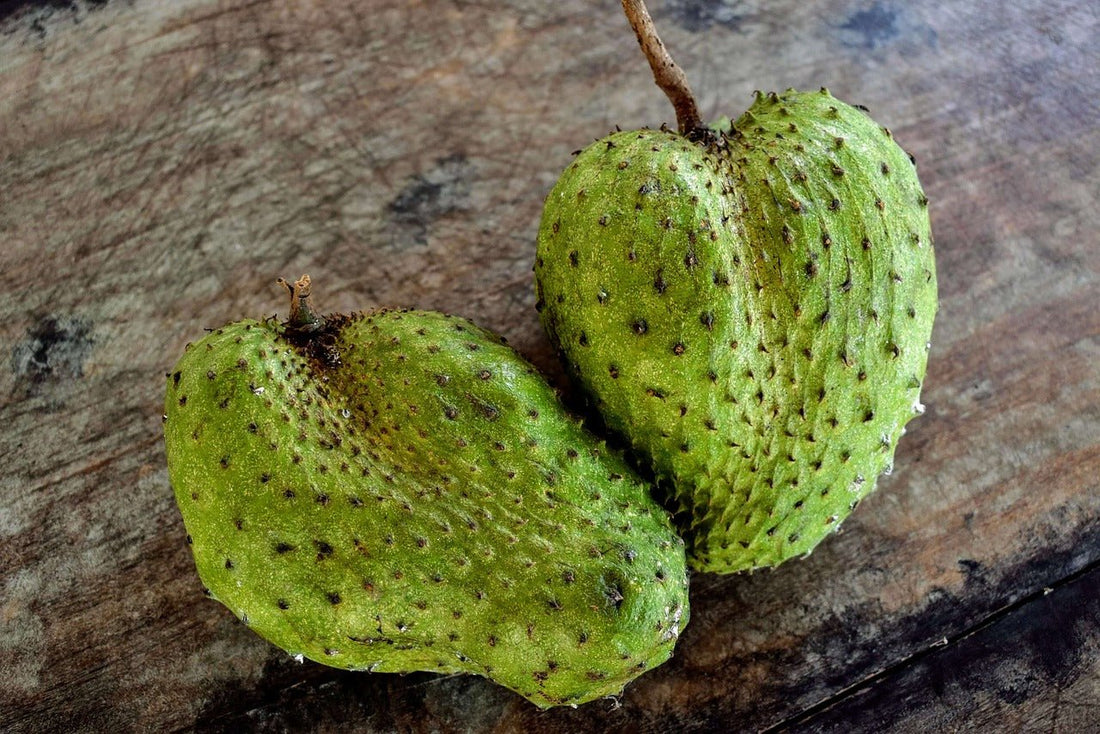
Exploring the Exotic Soursop
Share
Have you ever heard of soursop? This intriguing tropical fruit, also known as graviola, boasts a unique flavour profile and a host of potential health benefits. In this blog, we'll take a closer look at what soursop is, its nutritional content, and how it can be incorporated into your diet for a delicious and nourishing experience.
What is Soursop?
Soursop, scientifically known as Annona muricata, is a fruit native to tropical regions of the Americas, including the Caribbean, Central America, and parts of South America. It is characterised by its spiky green skin and soft, white, fibrous flesh. Despite its prickly appearance, soursop is prized for its sweet and tangy flavor, often described as a combination of pineapple, strawberry, and citrus.
Nutritional Content:
Soursop is not only delicious but also nutritionally dense, offering a range of vitamins, minerals, and antioxidants. Here's a glimpse into the nutritional content of soursop:
- Vitamin C: Soursop is rich in vitamin C, a powerful antioxidant that supports immune health and collagen production.
- B Vitamins: It contains various B vitamins, including thiamine, riboflavin, and niacin, which play essential roles in energy metabolism and nerve function.
- Potassium: Soursop is a good source of potassium, an electrolyte that helps regulate blood pressure and maintain heart health.
- Antioxidants: Soursop is packed with antioxidants like flavonoids, alkaloids, and acetogenins, which help protect cells from damage caused by free radicals.
Potential Health Benefits:
Beyond its delightful flavour, soursop is believed to offer a range of potential health benefits:
- Immune Support: The high vitamin C content of soursop may help strengthen the immune system and ward off infections.
- Digestive Health: Soursop contains dietary fibre, which supports digestive health by promoting regularity and preventing constipation.
- Anti-inflammatory Properties: Some research suggests that soursop may possess anti-inflammatory properties, which could help reduce inflammation and alleviate symptoms of inflammatory conditions.
-
Potential Relationship with Cancer: Soursop has gained attention for its potential anticancer properties, particularly due to its rich content of phytochemicals, such as acetogenins. Acetogenins are natural compounds found in soursop that have been studied for their potential anticancer effects.
Research conducted in laboratory settings and animal studies has shown promising results regarding the ability of soursop extract to inhibit the growth of certain cancer cells. These studies suggest that soursop may possess cytotoxic effects, meaning it can selectively target and destroy cancer cells while leaving healthy cells unharmed.
Incorporating Soursop into Your Diet:
There are various ways to enjoy soursop and reap its benefits:
- Fresh Consumption: Enjoy soursop fresh by scooping out the soft flesh and eating it as a snack or dessert.
- Smoothies and Juices: Blend soursop flesh with other fruits and liquids to create refreshing smoothies and juices.
- Desserts: Use soursop in recipes for pies, sorbets, and other sweet treats for a tropical twist.
We have made this easy for you with our NEW Broccoli, Celery & Soursop Juice. To order yours visit our shop here today.
Soursop is more than just a tropical fruit – it's a flavourful and nutrient-rich addition to a healthy diet. Whether enjoyed fresh or incorporated into recipes, soursop offers a delicious way to support overall health and well-being. So why not indulge in this tropical treasure and experience its delightful taste and potential benefits for yourself?

